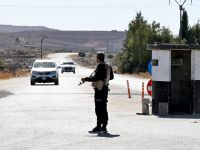The Saudi peace initiative draws on ideas from the past, but could succeed this time around because of its timing, Arab League chief Amr Moussa said.
The initiative proposed last month by Saudi Crown Prince Abdullah comes at one of the lowest points in more than a decade of failed peacemaking and has prompted a flurry of consultations in the Arab world ahead of a March 27-28 summit in Beirut, Lebanon, where Arab leaders are to consider adopting it as a united position.
In an interview with The Associated Press on Thursday, Moussa acknowledged the plan draws on past efforts to "emphasize what is necessary to be emphasized." But he said, "it comes after the deterioration of the peace process of the 1990s. It comes after the climate has become so poisoned. ... It is coming after the war between the forces of occupation and resistance to them. Therefore, it is different."
Moussa would not discuss details of the proposal, but broadly it calls for the Arab world to make peace with Israel if it withdraws from Arab lands captured in the 1967 War.
Saudi Crown Prince Abdullah is inclined to present his ideas to the Arab League summit next week. There are speculations that "full normalization" — a term generally meaning exchanges of ambassadors, trade relations and other typical interactions between states — could be watered down to a less committal guarantee of a comprehensive peace.
Moussa downplayed concerns, saying that if Israel ends its occupation and no longer threatens regional security "then normal relations as relations with any other country would be the net result."
The secretary-general added the exchange for normal ties would require Israel to agree to the establishment of a "viable Palestinian state." But Moussa indicated positions on key points of contention — Palestinian refugees, ensuring Israeli security, the fate of Israeli settlements — aren't explained in the proposal. Such matters, he said, would require Israeli cooperation.
"After this message of peace, we will see what kind of response we are going to get (from Israel)," Moussa said.
If Arab leaders adopt the initiative next week in Beirut and Israel accepts it, Moussa said it would "usher in a new era, a new climate that would encourage both sides to move ahead — and as quickly as we can — toward the end of this conflict." (Albawaba.com)
© 2002 Al Bawaba (www.albawaba.com)







